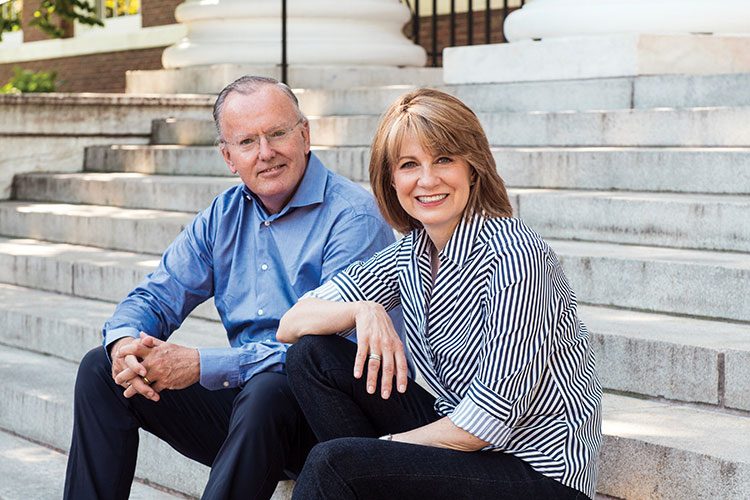Many baby boomers on the cusp of retirement are choosing an untraditional path: starting a new career that contributes to the greater good.
Among this group are Lisa (Heinz) Macpherson ’82 and Charles Larkin ’82 — who, coincidentally, are both preparing for this next phase as fellows in the Harvard Advanced Leadership Initiative (ALI).
“I’m part of a generation that grew up socially conscious and wants to be introspective about what’s next,” says Macpherson, a marketing executive who has worked with companies such as Fisher-Price, Timberland, and Pernod Ricard. “I want to take my skills and experience and try to change the world.”
In January, she and Larkin joined the 48-person cohort, composed of accomplished professionals who’ve traveled from all over the world to study in Cambridge. “All of us are — in some way, shape, or form — interested in service work across a broad range of interests,” Larkin notes.
The yearlong program’s core curriculum includes two main parts: professional skill-building classes and deep dives into complex issues like global health policy. In addition, each fellow chooses electives from any of the university’s graduate schools.
Macpherson decided to target digital technology, specifically how to mitigate its negative impacts on society and democracy. “As a chief marketing officer, I was part of the business model underlying the major digital platforms, and I started being concerned about the long-term impacts: misinformation, fake news, social polarization, and election interference,” she explains. “I realized that it has the potential to be a global issue on par with climate change.” Hoping to create better practices in the advertising community and increase digital literacy for consumers, she is considering her possibilities with a nonprofit, as a thought leader, or working in public policy.
Larkin, whose finance career most recently entailed running his private equity firm, is continuing to fine-tune his business acumen in order to help others enter the workforce. His electives have centered around organizational development and surveying social enterprises. During the summer, Larkin started designing an internship and job program for Boston teens, based on a program he developed in Johannesburg, South Africa. As part of a longer-term project required by ALI, he’s also working with a Massachusetts-based correctional facility on an employment-based recidivism-reduction program.
Considering ALI’s 2019 acceptance rate of 6.9%, it was a rare occurrence that Larkin and Macpherson became classmates for a second time. She now lives in Falls Church, Va., and he’s only 10 minutes from the Harvard campus. Thirty-seven years ago in Hamilton, the two ran in different circles — so, they were initially uncertain about their Colgate connection until they could confirm it in person. “I sensed that I knew her, but completely dismissed it because it seemed too ridiculous of a coincidence to occur,” Larkin says. Like at Colgate, where he was an economics major and she psychology, their academic focuses differ. But the two see each other at ALI social events and have friends in common.
As they begin to wrap up their fellowship year, Macpherson reflects: “It has been an extraordinary experience — the intellectual stimulation, the social stimulation, and the structure to reinvent yourself, to use your skills to do something different.”

